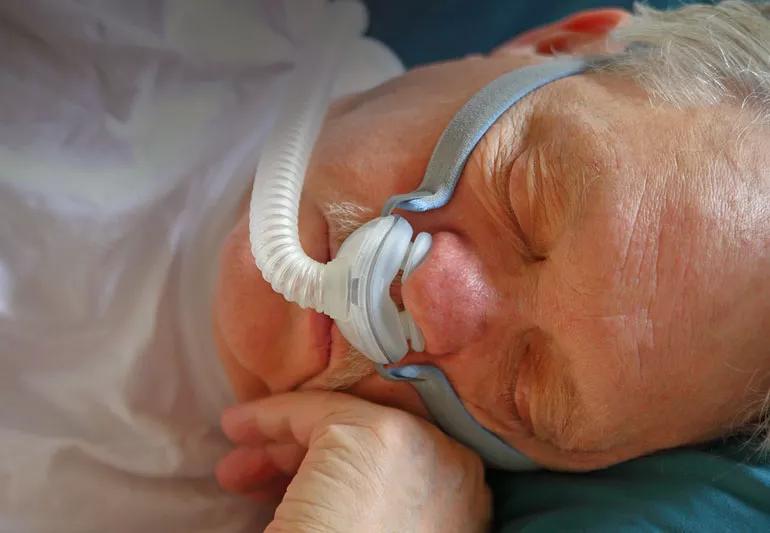Sleeping disorder may increase danger of cardiac event

Image content: This image is available to view online.
View image online (https://assets.clevelandclinic.org/transform/3c945eb0-158e-4db5-8bc4-86991cdc7177/manSleepCPAPmachine-1016796724-770x533-1_jpg)
man asleep wearing CPAP
Obstructive sleep apnea is common and linked to many medical problems. One common problem you may not be aware of is sudden cardiac arrest.
Advertisement
Cleveland Clinic is a non-profit academic medical center. Advertising on our site helps support our mission. We do not endorse non-Cleveland Clinic products or services. Policy
“When you have obstructive sleep apnea, not only are you likely to wake up with a headache and fall asleep during the day, but you’re also at risk of dying suddenly,” says cardiologist Bruce Wilkoff, MD. “For most patients, sudden death is not caused by a heart attack, but by abnormal heart rhythms.”
Sleep apnea is diagnosed when you stop breathing for 10 seconds or longer — at least five times an hour — during sleep.
Researchers suspect sleep apnea causes abnormal heart rhythms, which lead to sudden cardiac death, for a number of reasons.
“Sleep apnea may lower oxygen levels, activate the fight-or-flight response and change pressure in the chest when the upper airway closes, stressing the heart mechanically,” he explains.
It may increase inflammation and cause unhealthy changes in blood vessels as well.
Sleep apnea affects about 12 million Americans, according to the National Heart, Lung and Blood Institute, many of whom have not been undiagnosed. Symptoms include:
If you have any of these symptoms, it’s important to talk to your doctor. A visit to a sleep medicine specialist may be in order.
Advertisement
“Early identification and treatment of sleep apnea are key,” he says. “Several studies now link severe obstructive sleep apnea to higher mortality — even after accounting for risk factors such as obesity.”
In a five-year study of nearly 11,000 people, those with obstructive sleep apnea had a higher risk of sudden cardiac death. At greatest risk were those aged 60 and older with moderate to severe apnea (20 episodes an hour).
When their oxygen saturation levels dipped below 78% — preventing air from flowing into the lungs — their risk increased by 80%.
“In addition, our group has shown that people with severe obstructive sleep apnea have a two-to-fourfold greater risk of abnormal heart rhythms than people without sleep apnea,” he says.
Other researchers have found that patients with obstructive sleep apnea are more than 2.5 times as likely to experience sudden cardiac death between 12 a.m. and 6 a.m. as those without obstructive apnea.
Think you may have sleep apnea? It’s important to have it checked. Sleep apnea can lead to other heart health problems and impaired performance on the job or at school. Your doctor may suggest a sleep evaluation.
“Not only will getting treated for sleep apnea reduce your risk of a dangerous cardiac event,” says Dr. Wilkoff. “It will make you sleep better, and feel better, all around.”
Advertisement

Sign up for our Health Essentials emails for expert guidance on nutrition, fitness, sleep, skin care and more.
Learn more about our editorial process.
Advertisement
Ignoring the warning signs could put you at risk for serious health issues
Learn which type of sleep test is right for you
New study points out need for increased awareness
FDA-approved nerve stimulator helps open your airway
Mouth taping isn’t a recommended treatment for sleep apnea or snoring
Here’s what to know from a sleep medicine specialist
This connection is yet another reason to seek help for OSA
The short answer from a cardiovascular researcher
Type 2 diabetes isn’t inevitable with these dietary changes
Applying a hot or cold compress can help with pain
Pump up your iron intake with foods like tuna, tofu and turkey